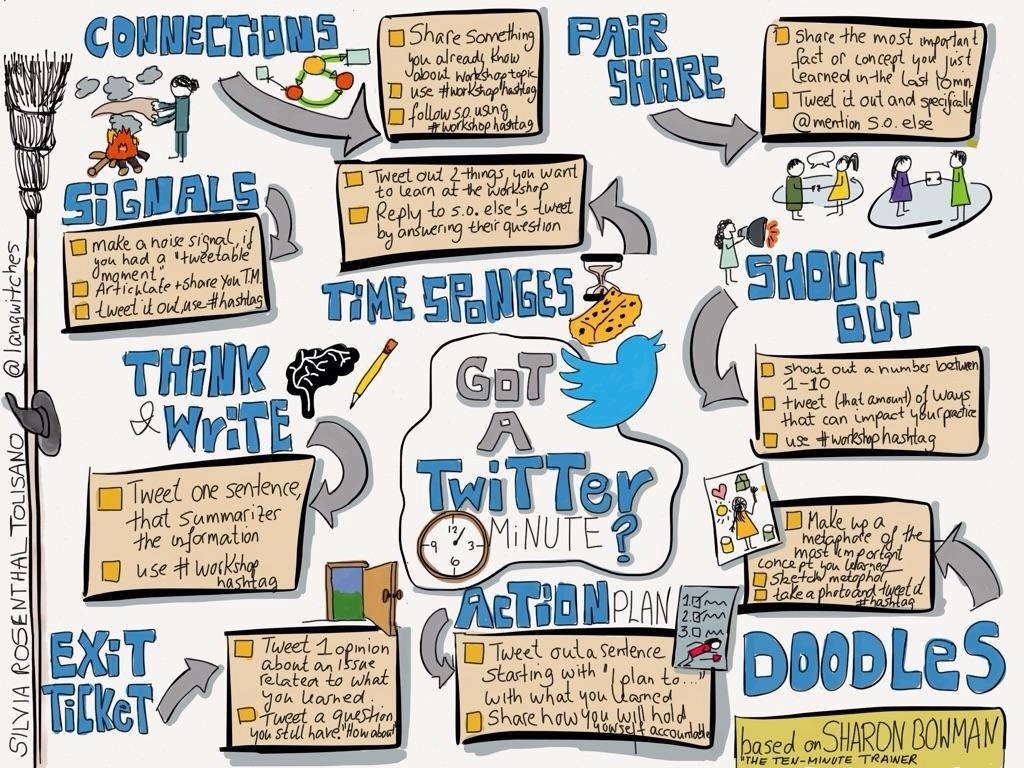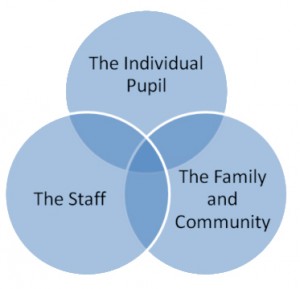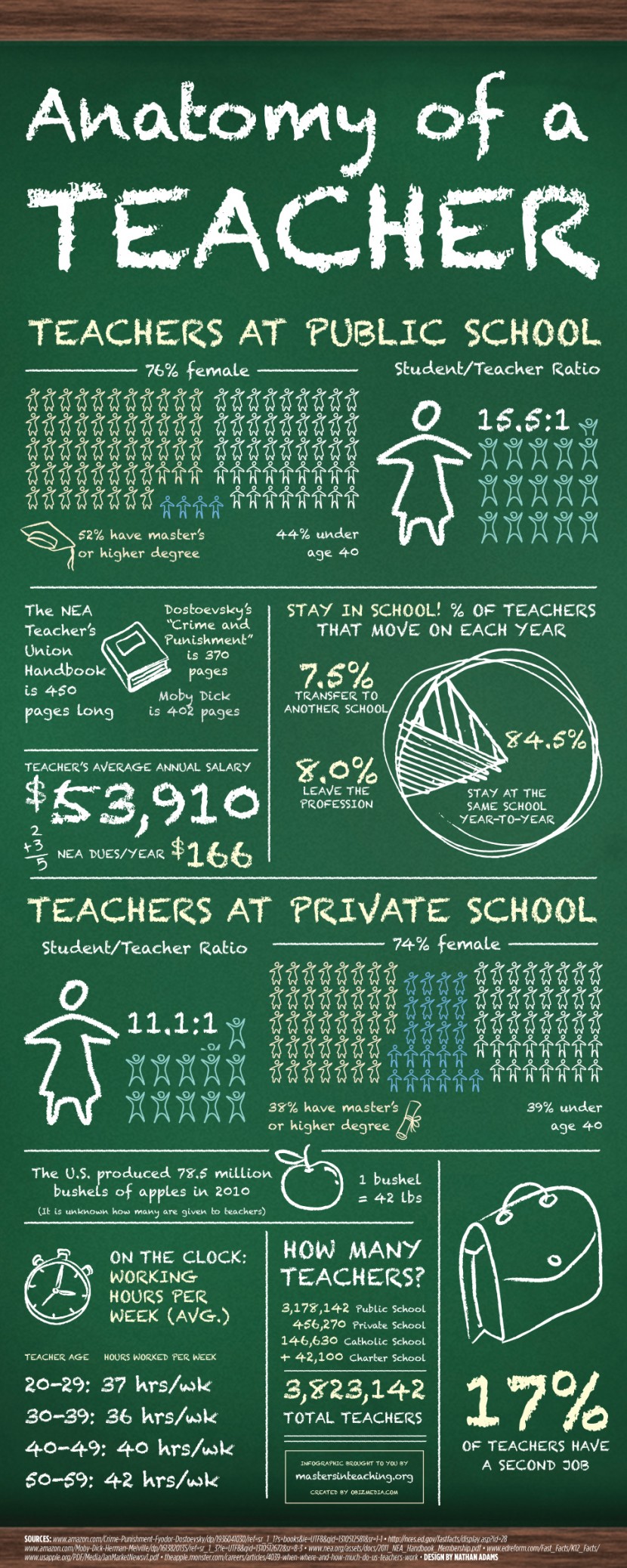Is Twitter An Effective Teaching Tool?
Yes, technology runs our world. Yes, everyone is consumed with the latest technology trends, gadgets, and apps. Yes, technology can be beneficial in our learning. But does there come a time when we stretch too far to qualify a specific technology as an effective teaching tool?
Take Twitter for example. Information is posted in condensed, 140-character posts in real-time from around the world. Seems useful. However, does allowing students to use Twitter for an educational purpose outweigh the distractions that can come with the website? Will a student be more interested in searching what the teacher has instructed them to, or will they want to know what so-and-so #subtweeted about so-and-so?
The following image displays some of the current ways that teachers can use Twitter with their students:
What do you think? Is Twitter a beneficial tool to be using with students in the classroom? Or are teachers trying too hard to adapt their lessons to their students desires in the hopes of maintaining their attention? Share your thoughts in the comment section below!
Smile
Inclusivity in Schools

While I was taking my Educational Psychology course last term, inclusivity in schools was a topic that was mentioned often. When I was in school, the teachers always talked about “including one another” in our activities and creating an environment where everyone felt “included”. But what makes inclusion work in schools? After doing some research (and looking through my Ed. Psych. textbook), here is a list of what I have found about this topic:
- An understanding of, and commitment to, inclusion
- A welcoming and safe school environment
- A strong administration team
- A focus on teaching all children
- Involvement from families and outside agencies
- Professional development for teachers and other school personnel
- Common planning time for teachers
- Effective instructional and assessment strategies to meet student needs
- Appropriate accommodations and support systems in place
- Opportunities for relationship and team building
- A commitment to continuous improvement and growth
Essentially, inclusion cannot just be taught to the students and forced upon them, but rather, it must be demonstrated and role modeled to them in all areas of their life. The student, the school staff, their individual families, and the surrounding community must all come together to foster a sense of inclusivity.
An Introduction to Bullying
“An Introduction“. Trust me on this; I will have many more posts about the topic of bullying, especially because it remains so prevalent in our school and society as a whole. But I wanted to give a basis of what bullying is and its different types, some which we may not necessarily recognize at first as bullying.
There are numerous types of bullying. The image below presents the four main types of bullying, experienced by children: Physical, Social, Verbal, and Cyber.
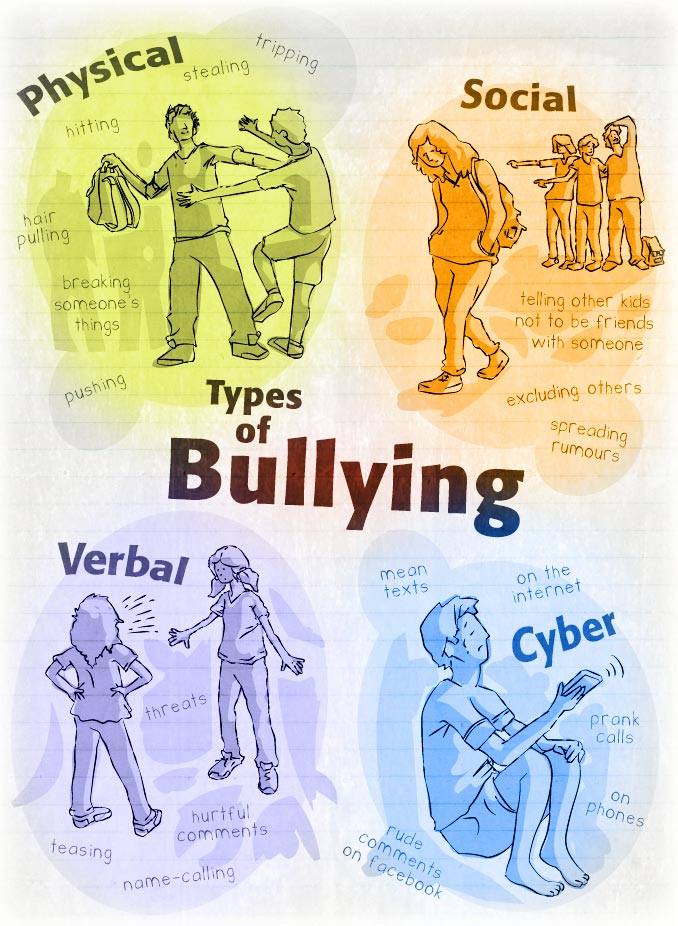
I’m sure most of us have experienced some type of bullying at one time or another in our lives, but just how many report being affected by the different types of bullying?

The numbers are astounding. Looking at the chart above, one would immediately picture the school ground as a battlefield! Children are being tormented at an alarming rate, and yet the majority of bullying goes unnoticed by the teachers, parents, and other adults in the child’s life. Why is this? I believe its because children are starting to accept that bullying is part of “growing up”; it’s something that everyone goes through. Due to this mindset, kids are starting to blur the lines between “friend” and “bully”, accepting them both into their friend groups. However, there are some major distinctions between the two:
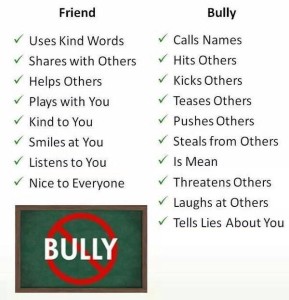
As someone who has been bullied, I am very passionate about this topic and I will continue to research ways to remove bullying from the lives of my future students.
Teaching Special Education
Teaching is a profession that is not for everyone. It is taxing, time consuming, and takes a lot of work. Sometimes the work is in the planning, sometimes in the instruction, sometimes in the guidance of students, and sometimes the work is in figuring out what works best when working with our students in our classrooms. But all of this work intensifies when you’re working with a student that has a learning disability or has an IEP.
Special Education teachers take pride in working with their students to excel beyond what would be achievable in a typical classroom. Their job is arguably one of the most difficult in the field of education, yet they display the same passion and dedication for their students like a classroom teacher!
What keeps them going? I have always believed that an exceptional teacher understands that education is more than academic excellence and standardized curriculum. In fact, a teacher can have a positive impact on the life of a child that can extend far beyond the classroom. Watching theses students overcome their challenges and excelling in school is what keeps Special Education teachers motivated and their spirits high.
I am definitely interested in earning an additional qualification in Special Education! This interest led me to find the video below. It talks about the importance of teaching special education and the rewards the come with the profession.
Male Teachers
The shortage of male teachers is a topic that has been heavily discussed in the education system, especially in the last few years. I constantly hear that the job market is flooded with teachers looking for employment, and that it will be a few years until many will be able to find work. Yet, when I tell people that I am pursuing my dream of becoming an elementary school teacher, they reply with, “You’re male and you want to teach at the elementary level – You won’t have any trouble finding a job!”
If this is the case, I often wonder where all the male teachers are? Do they not want to work with children? Is the salary too low? I was born with the passion of teaching, but maybe I’m a rare breed?
The image below really puts the topic of male teachers into perspective; their prevalence in schools, why the numbers are so low, and what the system can do to correct this imbalance.
Teaching Anxiety
I’m going to be honest with you all… There are times when the thought of becoming a teacher scares the crap out of me. There are so many things that could go wrong. I could teach a lesson completely wrong. I could teach a lesson correctly, but what if none of my students understand? What if all the students turn against me and I have to barricade myself behind my desk?
OK, may the last scenario was a little far fetched (fingers crossed), but nonetheless, these thoughts run through my mind. This led me to wonder if anyone else felt this way before becoming a teacher. A post on teaching.monster.com gave me the relief I was looking for; there are other people out there with teaching anxiety! In fact, they posted a list of 15 Things I Wish I’d Known Before Becoming a Teacher:
1. Relating to every student takes research.
2. Be Prepared for anything and everything to happen on your watch.
3. Student teaching may not completely prepare you for your own classroom.
4.What you want to teach may not be in demand when you look for a job.
5.Working with parents is hard.
6. Your principal can be your greatest ally or biggest enemy.
7. More degrees mean more pay.
8. Earning the respect of students is hard work: the older the students, the harder the work.
9. Getting supplies for class is sometimes impossible unless you spend your own money.
10. The day before a vacation day brings back child-like excitement.
11. You’ll make some of your best friends teaching in a school.
12. The internet is your friend.
13. Only someone who’s been alone in a classroom full of students can appreciate exactly what your job is like.
14. A note of thanks from a parent or student will mean more than any gift.
15. Students are amazing creatures.
While I know there are going to be times when I completely doubt myself and my teaching abilities, I know that this is normal for a teacher. In hindsight, I’m sure it helps to keep teachers on their toes, bettering themselves for the sake of their students.

